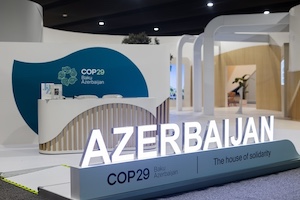COP29 Climate Summit Approves Carbon Credit Trading for All Countries

The 29th United Nations Climate Summit (COP29) opened on November 11 in Baku, the capital of Azerbaijan, for a 12-day session. On its first day, the summit approved a global carbon trading mechanism, allowing countries to freely trade carbon credits, marking a significant step toward achieving climate goals.
COP29 primarily focuses on issues such as "climate change, energy transformation, and carbon financing," as well as "climate risk adaptation measures." According to international reports, after a decade of preparation and discussion, the global carbon trading mechanism, led by the United Nations, was officially launched during this summit. It is expected to begin operating as early as next year. The system aims to push major polluting nations to reduce carbon emissions and provide financial assistance to developing countries in the fight against climate change.
Carbon credits, commonly referred to as carbon allowances, represent a permitted quantity of greenhouse gas emissions. One carbon credit equals the allowance to emit one ton of CO2 or its equivalent in other greenhouse gases. Countries and companies can invest in carbon reduction programs and purchase carbon credits to offset their own emissions.
Following the landmark Paris Agreement of 2015, COP29 furthered the concept of allowing countries to freely purchase carbon credits. Under this new global carbon market mechanism, carbon credit trading will be regulated by the United Nations, enabling countries and companies to buy and sell carbon credits within the UN framework despite potential political challenges, helping them meet their climate targets.
Notably, only UK Prime Minister Rishi Sunak from the G7 attended the summit, while leaders of the world's top 13 carbon-emitting countries were notably absent. Many major powers were not represented by their leaders.
- 176 reads
Human Rights
Fostering a More Humane World: The 28th Eurasian Economic Summi

Conscience, Hope, and Action: Keys to Global Peace and Sustainability

Ringing FOWPAL’s Peace Bell for the World:Nobel Peace Prize Laureates’ Visions and Actions

Protecting the World’s Cultural Diversity for a Sustainable Future

Puppet Show I International Friendship Day 2020

